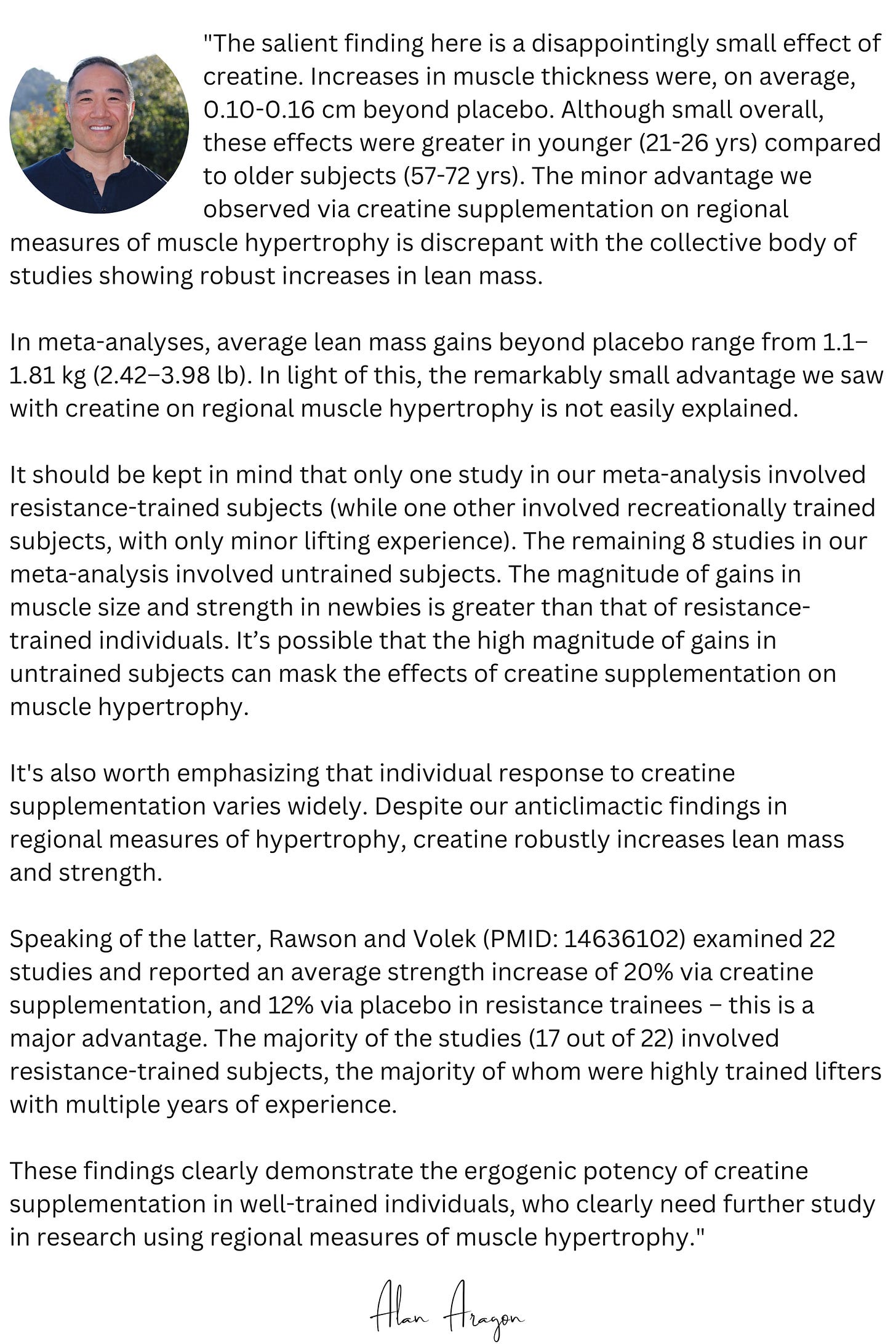Is Creatine Worth It? Science Says...
My breakdown and interpretation of a recent creatine meta-analysis.
In this article:
I’ll interpret the latest peer-reviewed creatine meta-analysis.
My thoughts on the surprising results.
Is creatine worth it? Let’s discuss.
A statement from Alan Aragon, a member of the team conducting this meta-analysis.
Spank’n New Research - Creatine Meta-Analysis
Meta-analysis definition: examination of data from a number of independent studies of the same subject, in order to determine overall trends (Oxford Languages, 2023).
I woke up on Tuesday morning, showered, had my daily whey/water/dash of coffee shake with a piece of fruit on the side (it was a pear), and made my way to my desk. This is my morning routine and I usually jump right into online client programming and emails. However, a new meta-analysis on creatine just dropped and I couldn’t wait to read it, interpret it, and summarize it for you. After all, creatine is the most studied and most effective over-the-counter supplement when it comes to muscle growth, so it’s highly relevant to our interests!
Researching and studying helps us learn about and discover new things. Oh, and this doesn’t only apply to the scientists behind the studies.
The cool part about reviewing studies is you don’t actually need to be one of the scientists doing the direct research to benefit from their work.
If you take the time to review their published findings, you’ll get all of the knowledge-based benefits and be able to implement them in your own practices without ever having to slip on a lab coat. Pretty awesome, right? Let’s dig in!
The Paper
Title: The Effects of Creatine Supplementation Combined with Resistance Training on Regional Measures of Muscle Hypertrophy: A Systematic Review with Meta-Analysis
“The purpose of this paper was to carry out a systematic review with a meta-analysis of randomized controlled trials that examined the combined effects of resistance training (RT) and creatine supplementation on regional changes in muscle mass, with direct imaging measures of hypertrophy” (Burke et al., 2023).
Metrics & Parameters
Study Count: This meta-analysis reviewed data from 10 different studies.
Supplement: Creatine Monohydrate
Dosage: “One study involved a creatine ‘loading’ phase, which involved the consumption of 20 g/day of creatine for 5 consecutive days prior to consuming 5 g/day for the remaining duration of the study; one study involved the supplementation of either 6 g/day of creatine or 6 g/day of creatine in combination with 30 g of whey protein; and all the other studies implemented dosing protocols of either 0.1 or 0.15 g/kg/day of creatine. Three studies involved the ingestion of creatine two–four times per week and all the other studies involved the ingestion of creatine five–seven times per week” (Burke et al., 2023).
Resistance Training: “All the studies incorporated a parallel group design and all the resistance training sessions were performed two–five times per week. One study solely focused on training the elbow flexors; all the other studies implemented total-body training protocols” (Burke et al., 2023).
Test Subjects: Participants ranged from 21 to 72 years old. Four studies included subjects ranging from 21 to 26 years old and six studies included subjects ranging from 57 to 72 years old. “Two studies employed resistance-trained participants and the others employed untrained participants” (Burke et al., 2023).
Duration: Reviewed studies required a minimal duration of 6 weeks.
Methods of Muscle Measurement: Magnetic Resonance Imaging (MRI), Computed Tomography (CT), or Ultrasound
The Results
Creatine monohydrate supplementation, when combined with regular resistance training, does increase muscle hypertrophy. Unfortunately, the degree of increase is “trivial to small” (Burke et al., 2023).
A greater degree of muscle hypertrophy was seen in younger individuals, those in the 21 to 26 year old group versus the 57 to 72 year old group. But, again, the degree of added growth in the younger group is trivial. “Overall, the practical implications of our findings that showed greater gains in young adults is questionable given the relatively modest magnitude of the effect between these populations” (Burke et al., 2023).
Duration of supplementation seems to impact results, albeit slightly. Greater results were reported with shorter duration (10 weeks or less) versus longer duration (16 weeks or more) protocols. “However, the differences between these timeframes were trivial and likely of little practical significance” (Burke et al., 2023).
But Other Studies Say I’ll Gain Pounds of Lean Mass!
What is lean body mass? “Lean body mass is calculated as the difference between total body weight and body fat weight, or more simply, the weight of everything except the fat” (Tanita.eu, 2020).
Keeping the definition of lean body mass in mind, we’re looking at bone, muscle, and any other non-fat substance in the body…including water. That last one, good old H2O, is a big deal and it’s a mega-factor in how some creatine study muscle growth results are so different than the ones included in this meta-analysis. It’s all in the method of measurement!
Let me explain. We know creatine pulls water into muscles as it saturates their stores and we know that water counts toward lean body mass. We can also confidently say that when the average person hears the term ‘lean body mass’, they think of muscle mass.
When a supplement company’s ad makes the claim that their creatine product adds pounds of lean body mass in a matter of weeks, they’re not lying, but it’s also not muscle. The majority of that lean mass is water.
Misleading? Yes. Lying? No. They’re using the technical definition of lean body mass and study data that relies on lean body mass measurements over more accurate measures of muscle growth, and they’re very likely doing it on purpose. Gauging growth on lean body mass paints creatine as a powerful OTC muscle-building supplement. Gauging growth through MRI, CT, or Ultrasound, pulls back the curtain and shows how much creatine actually delivers on it’s muscle growth reputation.
Is creatine propped up with misleading lean body mass studies?
Is it deserving of the OTC king title?
Is it worth taking?
My Thoughts
I’m not gonna lie, disappointment hit me me while reviewing this meta-analysis. Based on this paper, creatine monohydrate supplementation for the purpose of muscle growth seems, well, trivial. This is especially true for older individuals, but seems applicable to all age groups based on the data. Let’s recap:
Creatine + resistance training = increased growth…but it’s trivial.
Younger subjects saw greater growth…but it’s trivial.
Shorter duration protocols worked better…but it’s trivial.
This is a bit of a wake up call when it comes to supplementation for muscle growth, considering that creatine holds the top spot in the over-the-counter category. I repeat, the top spot.
If the OTC king delivers results, classified by highly-regarded scientists, as trivial, where do other hyped supplements fall (beta alanine, citrulline, BCAAs, arginine, carnitine, to name a few)? Do they also deliver less-than-hyped results? I don’t know about you, but this has me asking myself a handful of questions!
Is creatine worth the cost?
Is the hassle of making sure I take my daily dosage worth the results?
Would the money I spend on creatine be better spent elsewhere?
Is creatine worth taking for reasons outside of increased muscle growth?
Is Creatine Worth the Cost?
As I’m typing this, it’s October 26th, 2024. I can pick up 500g of creatine monohydrate for $25.00 and 600g of micronized creatine monohydrate (mixes into liquid better) for $50.00.
Let’s break down the 500g product cost. With no loading phase, and assuming a dosage of 5g per day, we’re looking at 100 servings lasting 100 days.
At a total cost of $25.00, that breaks down to $0.25 per day, so a quarter a day.
To me, that’s a very low cost to supplement with creatine. Based on that cost and it’s slight benefit to muscle growth, I feel it’s worth it. Of course, my financial situation and outlook is not equal to yours, so you may feel differently. That’s a decision you need to make and the information I’m laying out is meant to help you make that call.
Is the Hassle Worth the Results?
This answer involves no numbers. It’s all about how much time you want to devote to supplementation and how full your cup is with things to do.
I’m going to be real with you and tell you I’ve never consistently/continuously supplemented with creatine for more than a month.
I’ve started and stopped many times, but not on a schedule. I wish I could call it implementing purposeful short-term protocols, but I can’t. I just failed, over and over, to keep dosing it.
Is it simple for me to, once per day, scoop some powder into any of my drinks? Of course it’s simple. But does it get de-prioritized and forgotten within a few weeks? Every time.
For me, the hassle just isn’t worth trivial results. Yes, creatine will give me a slight edge, which could add up over time, but I just can’t seem to stick with it…and based on this new meta-analysis, that’s OK.
Would the Money Be Better Spent Elsewhere?
When framing this question, ‘elsewhere’ refers to another supplement. Our bodies will naturally produce creatine, but we can also obtain it from eating different meats (red meats, poultry, and fish). Assuming your diet contains meats, and we combine your daily meat-obtained creatine and naturally produced creatine, you’re likely not going to be deficient.
Supplementing with creatine is meant to ensure our muscle stores are continually ‘topped off.’ I’d say supplementing is more about ensuring max capacity versus preventing deficiency, provided you eat meat.
To me, supplementation is most important when it prevents deficiencies in important macro or micronutrients.
Unless you don’t eat meat, I do feel the money would be better spent on another supplement, particularly one that safeguards against macronutrient or other micronutrient deficiencies. A performance-based multivitamin or greens supplement both come to mind as micronutrient-providing examples. I’d much rather put my hard-earned dollars towards a well-rounded multivitamin than creatine, just say’n.
Is Creatine Worth It for Effects Outside of Muscle Growth?
First, let me list some of creatine’s potential benefits, per Mayo Clinic’s creatine overview page.
Injury prevention: Oral creatine might reduce the frequency of dehydration, muscle cramping, and injuries to the muscles, bones, ligaments, tendons and nerves.
Rare creatine-metabolizing syndromes: In children with the certain creatine deficiency syndromes, oral creatine supplements might improve some symptoms.
Cognition and brain health: Creatine supplementation might improve performance during cognitive tasks, especially in older adults.
Sarcopenia and bone health: Creatine supplementation might help counteract age-related declines in skeletal muscle and bone mineral density.
Skin aging: Early research suggests that a cream containing creatine and other ingredients applied to the face every day for six weeks might reduce skin sag and wrinkles in men. Another study suggests that a cream containing creatine and folic acid improves sun damage and reduces wrinkles.
Full disclosure, I haven’t looked into the studies behind these added benefits. However, these are benefits that strike me as high-value.
We’re talking muscle hydration, cognitive improvement, bone density maintenance, and possible, but not heavily studied, improved skin quality and wrinkle reduction.
These are great benefits and should definitely be taken into account when you’re weighing out whether or not creatine is worth it for you.
A Statement from Alan Aragon
Alan is member of the team of scientists behind this creatine meta-analysis and since he’s a great guy, a fellow bro, and is focused on getting scientific findings in front of interested people, he provided his summary, which I’ve quoted below.
Side note: I’ll admit I’m fanboying a little here, but I’m so pumped to have talked with Alan directly and requested a statement from him on this paper! Thanks again, Alan.
One thing I need to mention, which I find most intriguing about Alan’s statement, is the portion about strength increase.
He mentions a 20% increase in average strength in resistance-trained subjects, the majority of whom were highly trained lifters with multiple years of experience. These increases in strength could easily add up to increased workload/volume and promote muscle and strength gains over time.
While this particular meta-analysis did not focus on strength increase, he brings up an important piece of information, which is worth looking into and considering when deciding if creatine is worth it to you.
Conclusion
This article most-likely taught you some new things about creatine and made you think of it in new ways. As someone who has used creatine from time to time, but been off it for the majority of my lifting career, I never placed a high value on it.
I always regarded it as the most-studied supplement and one that actually worked, but at the same time, I never viewed it as a magic bullet. In fact, I don’t view any OTC supplements as magic bullets.
To me, OTC supplements, like creatine, provide a small increase in performance, but are nowhere near as important as training hard, training smart, training consistently, managing recovery, and eating correctly for your goals.
Before you rack up a monthly supplement bill rivaling your utilities, make damn sure you have your training, recovery, and nutrition in check. The thought of supplementing with the latest line of hyped products can be tempting, exciting, and fun, and I get that, but please keep things in perspective.
I’d hate to end on a bit of a Debbie Downer note, so let me drop some cheesy comedy to change the mood. Why did the rooster keep going to the gym? He was working on his pecks.
Thank you for your time and if you’d like me to be your coach, I’ve been providing services to clients for 15 years and am happy to provide you with a free assessment. Text SUBSTACK to 919-671-8585 or email your inquiry to ryan@trainingwithryan.net.
References
Burke, R.; Pinero, A.; Coleman, M.; Mohan, A.; Sapuppo, M.; Augustin, F.; Aragon, A.; Candow, D. G.; Forbes, S. C.; Swinton, P.; Schoenfeld, B. J. The Effects of Creatine Supplementation Combined with Resistance Training on Regional Measures of Muscle Hypertrophy: A Systematic Review with Meta-Analysis. Nutrients, 2023.
Mayo Clinic Staff. (2021, February 9th). Creatine. Mayo Clinic. https://www.mayoclinic.org/drugs-supplements-creatine/art-20347591
Tanita Staff. (2020, March 3rd). Lean Body Mass Explained. Tanita. https://tanita.eu/blog/lean-body-mass-explained














I'm curious to know female specific results although I'm sure it's less studied in females versus males.
I feel like I notice a difference when taking but maybe it's all in my head...